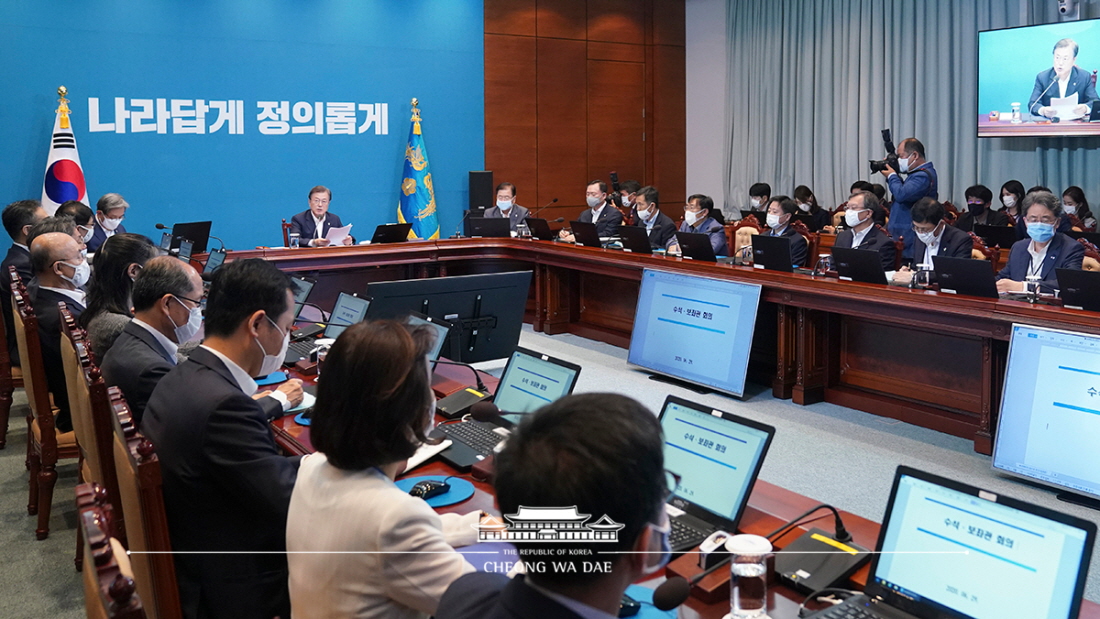이 웹사이트는 제19대 대통령 임기 종료에 따라 대통령기록관이 「대통령기록물 관리에 관한 법률」에 의해 이관받아 서비스하는 대통령기록물입니다. 자료의 열람만 가능하며 수정 · 추가 · 삭제는 불가능합니다.
다만, 「개인정보보호법」에 의하여 개인의 정보를 보호받기 원하시는 분은 관련 내용(요청자, 요청내용, 연락처, 글위치)을 대통령 웹기록물 담당자(044-211-2253)에게 요청해 주시면 신속히 검토하여 조치해 드리겠습니다. 감사합니다.
SPEECHES & REMARKS
BRIEFINGS

The number of confirmed COVID-19 cases around the world has surpassed 10 million, with the death toll now exceeding 500,000. Even more concerning, the upward trend of new infections worldwide has not abated but is actually increasing. This is not a situation for complacency because infection clusters continue to occur sporadically in our country as well. However, locally transmitted infections in Korea are well within the manageable and controllable scope.
I hope our people can stay strong a little longer while complying with epidemic prevention and control guidelines and rules, just as they have done so far, trusting the Government’s response capabilities.
The prolonged COVID-19 pandemic has aggravated the global economic downturn even more. Our economy, too, has a structure that cannot remain free of that influence. The challenges will be difficult to overcome through efforts from businesses and the Government alone. We all must join forces and set out to surmount the national crisis together.
Above all else, support from the National Assembly is urgently needed. A month has already passed since the 21st National Assembly’s term began. The first extraordinary session in the National Assembly could end this week with no outcome or achievement. I trust that the National Assembly will no longer neglect people’s economic suffering caused by the COVID-19 outbreak. I am once again calling on the Assembly to respond to the urgent requests of the people and businesses, who are ardently looking forward to the third supplementary budget.
This week marks one year since Japan unilaterally imposed export restrictions on us. Over the past year, we have unwaveringly tackled Japan’s provocative measures head on, turning it into a new opportunity instead.
Some predicted that Japan’s unilateral measures against certain core materials used in our flagship semiconductor and display industries would deal a direct blow to the Korean economy, but they turned out to be wrong. Not a single case of production disruption has occurred to date. Instead, domestic businesses have managed to stabilize supply chains for their core items. They hastened localized production in the materials, parts and equipment industries, and they diversified suppliers. They opened the way for building a strong economy that cannot be shaken.
Importantly, the private and public sectors have made an all-out, concerted response, while large and small companies as well as suppliers and product end-users joined forces. These efforts have served as a decisive driving force for overcoming the crisis. We’ve gained confidence that, if we set a goal and pool our capabilities, we can break away from the old types of economic dependence. This has been an invaluable, irreplaceable experience.
However, we cannot afford to remain complacent with our achievements over the past year. The COVID-19 outbreak has strengthened the forces of protectionism and national self-interest around the world. The established international division of labor has begun to crack, and the global supply chain is being rapidly reshaped. It is a very serious threat that cannot be compared to Japan’s export restrictions.
Now we must go beyond defensive responses in the face of a crisis. We must shift to a more proactive stance to turn the global supply chain crisis into a new opportunity for us.
We have to clarify our bold aspiration to emerge as a “powerhouse for materials and parts” and a “global production hub for high-tech industries.” Moreover, the public and private sectors again need to work closely together to mobilize all our nation’s capabilities. I ask you to prepare public reports on the Government’s strategies and plans.
Meanwhile, this week will be a time to focus on reviving contracted spending and tourism. Rising credit card sales show that spending is on an upward trend, and consumer propensity is gradually recovering. We must build on this momentum. Although the COVID-19 situation is worrisome, we must succeed in our efforts to stop the epidemic while boosting consumption at the same time.
I hope that the “Republic of Korea All-together Sale” that started last week will be a good opportunity. It can serve to kill three birds with one stone, namely contributing to recovery in spending and economic revitalization, resuscitating companies and microbusinesses, and providing the people with discounts on their purchases. I am looking forward to people taking an active interest in this program and consuming more.
I would also like see domestic travel come back. I hope that this vacation season gives the tourism industry some breathing room and that it will serve as an opportunity for people, exhausted by the COVID-19 pandemic, to rest and recharge themselves. Most of all, the pandemic will make travel abroad difficult for a considerable period, so I expect this will be a chance for us to return to domestic travel and rediscover the beauty of our land and the charm of local trips.
Traveling safe from COVID-19 is very important. Besides thorough infectious disease prevention and control measures at tourist sites, we need everyone’s cooperation to encourage safe travel and leisure practices. I would especially like to ask the central and local governments to provide the proper information that allows travelers to vacation at alternative locations over a wider range of time. I also ask for people’s active cooperation.
I would like to see everyone take full advantage of the Special Travel Week, which will commence from July 1. I also ask the central and local governments to set an example by giving their employees a wider range but scattered vacation periods.



